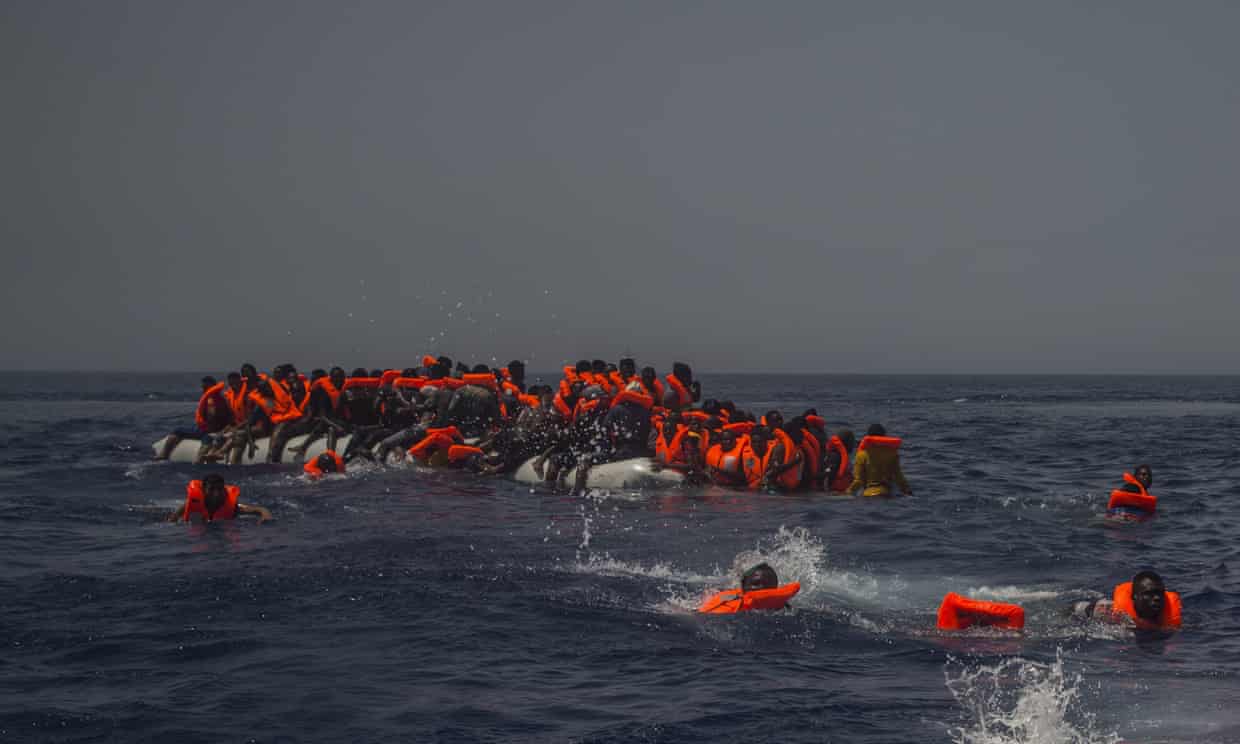The UN has imposed sanctions for people trafficking on Libyans closely associated with the country’s EU-funded coastguard or with a deal made with the previous Italian government to slow migration, in a move that raises doubts about European policy in the area.
One of those subject to the UN asset freeze is a former militia leader, Abd Al Rahman al-Milad, who is the head of the EU-funded regional unit of the Libyan coastguard in Zawiyah.
NGOs have long accused the Zawiyah coastguard of being the one most willing to use violence to drive Europe-bound migrant boats back to land. It has been suggested Milad is playing a double game in which, under the guise of the coastguard, he stops rival traffickers but continues to smuggle himself.
The sanction listing says UN experts monitoring sanctions claimed Milad and other coastguard members were “directly involved in the sinking of migrant boats using firearms”.
The UN sanctions raise questions about the viability of the highly pragmatic deals made the previous Italian government, notably by the former interior minister, Marco Minniti, with Libyan militia leaders.
The listing says: “Several witnesses in criminal investigations have stated they were picked up at sea by armed men on a coastguard ship called Tallil (used by al-Milad) and taken to al-Nasr detention centre, where they are reportedly held in brutal conditions and subjected to beatings.”
A second Libyan subject to sanctions is Ahmad Oumar al-Dabbashi, widely seen as central to a deal with the Italian interior ministry last year to control the flow of migrants.
The UN documents state that his militia group controls “departure areas for migrants, camps, safe houses and boats” and has exposed migrants – including minors – to “brutal conditions and sometimes fatal circumstances on land and at sea”.
Mus’ab Abu-Qarin, another of the six subject to an assets freeze, is accused in the UN listing of leading a transnational trafficking network, smuggling 45,000 people by sea in 2015 alone.
Abu-Qarin, who also struck deals with the Italian government, is accused of organising a migrant boat journey from Libya to Italy on 18 April 2015 in which 800 people drowned after the boat sank off the Libyan coast. It was one of the worst migrant boat disasters in the Mediterranean Sea.
The Italian government has never been clear what money was handed to Libyan politicians or for what purpose.
The Dutch national prosecutors’ office said: “These sanctions will help stop the flow of blood money … It will prevent them from buying protection in Libya which in turn can destabilise the region.”
The UK foreign secretary, Boris Johnson, welcomed the sanctions without making any mention of the background of some of the six. “This is the first time the UN has used sanctions against people traffickers, and builds on the work initiated by the UK in December 2017 – following reports of slave auctions in Libya in December 2017 – to secure a strong security council condemnation of those involved in people trafficking,” he said.
Sanctions were imposed on six Libyans in total. The final two listed are Mohammed Kachlaf, head of the Shuhada al-Nasr brigade in Zawiyah, and Fitiwi Abdelrazak.
The African Union said in December there were an estimated 400,000 to 700,000 migrants in more than 40 detention camps across Libya, many in inhumane conditions.
The new Italian interior minister and leader of the far-right party the League, Matteo Salvini, has said his first overseas trip may be to Libya. He says he does not want Italy to be an accomplice in people trafficking.
His predecessor Minniti has given a series of interviews arguing that his strategy of trying to co-operate with African governments and regional powerbrokers remains the best way to stop the flow of migration into Italy. He has urged Salvini to tone down his anti-African rhetoric if Italy is to ensure co-operation from Africa about the flow of migration to Europe.






